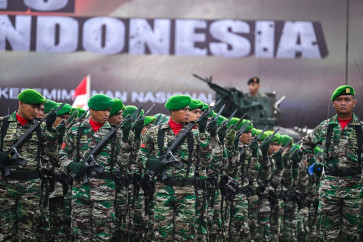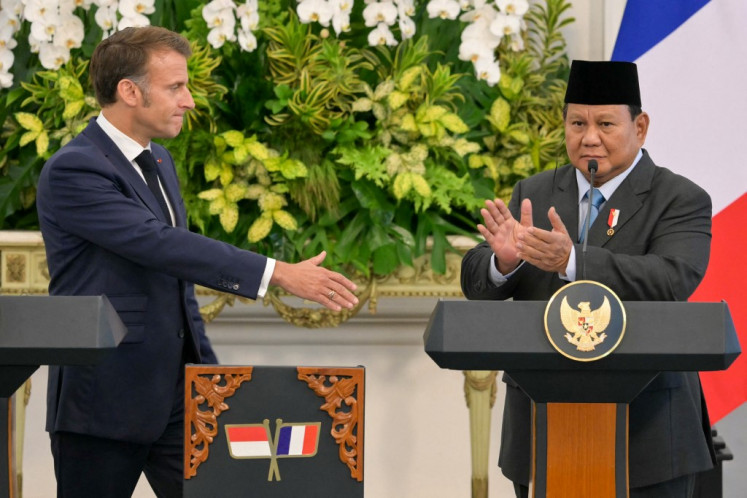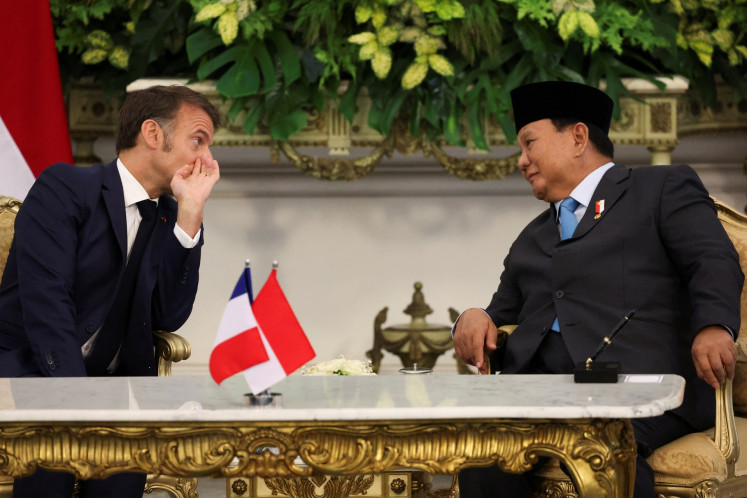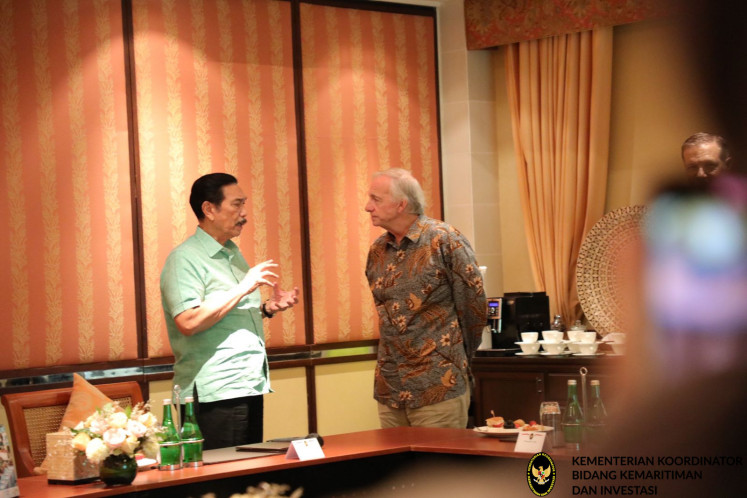Long and winding road to beating COVID-19
Indonesia's pandemic response has been beset by comorbid economic stagnation, but there is really only one road that will lead the country to salvation.
Change text size
Gift Premium Articles
to Anyone
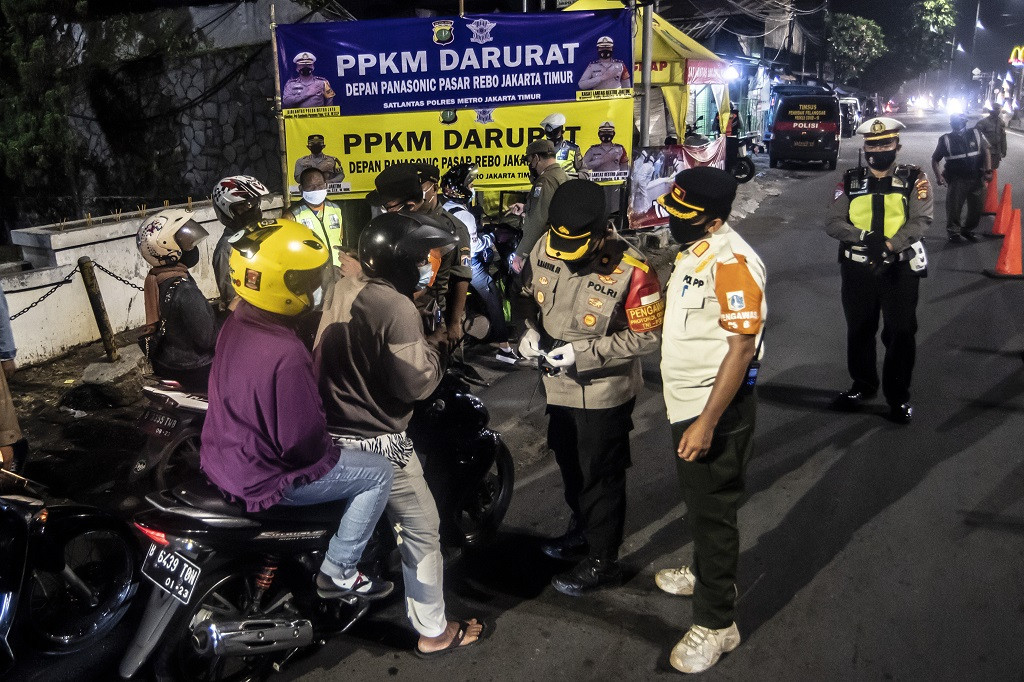
I
n July 2021 when the Delta variant spread quickly in Indonesia, the World Health Organization (WHO) and several pandemic experts warned the country of the possibility that it could become the new epicenter of the COVID-19 pandemic in Asia.
The Delta variant, which is more dangerous and transmissible than the original strain, has raised global concern, not only because of the high number of infections it has caused, but also for its potential to create new and more virulent variants through mutation if the contagion is not handled quickly through appropriate policies.
The government of President Joko “Jokowi” Widodo has imposed strict public mobility curbs (the PPKM, PPKM Darurat and more recently, the four-tier PPKM with some easing) to deal with this Delta-variant storm. In my article published on July 26, 2021 in Koran Tempo, I reminded the government that early relaxation of the PPKM would result in a pandemic trap that would accelerate virus transmission within a short time.
Prematurely easing the restrictions amid the high caseload and fatality rate will only cancel out the major efforts being made to increase hospital capacity, isolation facilities, oxygen and medicinal supplies and the number of health workers.
Instead of increasing the number of daily tests amid the surge in cases, both in and outside Java, the government has reduced the testing rate. This has resulted in a low number of confirmed cases merely to justify relaxing the emergency PPKM on July 20. The move amounts to data manipulation, as the figures do not reflect the real condition in the field.
The number of samples tested on July 20 and 19 stood at respectively 170,000 and 160,000, for example, down from the figure in excess of 250,000 samples tested on July 16 and 17.
This pattern was repeated during the initial PPKM level 4 that ended on Aug. 2. On Aug. 1 and 2, respectively 178,000 and 152,000 samples were tested, way below the range of between 260,000 and 270,000 samples recorded on previous days.
The data recorded on Aug. 3 reinforces this explanation. The number of new cases increased in comparison to the Aug. 2 data, because more than 248,000 samples were tested on that day.
In addition, the cause behind the declining bed occupancy rate (BOR) reported at many hospitals in Java requires a deeper look, whether it was because many patients preferred to self-isolate at home to avoid poor health services, given the fact that health workers were overwhelmed. Other patients perhaps opted to self-isolate to ease the burdens of health workers.
In sum, a declining BOR does not necessarily reflect a drop in COVID-19 transmission. In fact, the Delta variant has quietly spread to various regions and islands across Indonesia.
The number of deaths also remained high when the first period of the PPKM level 4 ended on Aug. 2. Within seven days of PPKM level 4, the average number of COVID-19 deaths per day hit 1,800. It was ironic, therefore, that the government claimed cases of infection were on the decline when many lives were not saved.
There are many questions about the government’s data. It seems that during the PPKM, the government focused on achieving the WHO’s pandemic control rates but on the other hand, it neglected efforts to reduce the deaths that could have been prevented if more testing and tracing had been done in the first place.
In fact, reports of new confirmed cases also illustrate that infections are increasing in regions outside Java. On July 27, non-Java regions accounted for 38 percent of all new cases nationwide, but on Aug. 2, their share had increased to 46 percent, which could indicate that a new epicenter of COVID19 transmission had emerged outside Java. If no immediate measures using the right approach are taken, the public health system outside Java will be in jeopardy. As we know, health facilities and of services in the regions do not match those in Java in terms of quality, not to mention the availability of health workers.
No doubt Jokowi's decision to relax the emergency PPKM was based, to a certain degree, on the need to keep the economy running. But it must be understood that rebuilding global and market confidence in Indonesia will be largely determined by the country’s ability to control the pandemic.
The decision of foreign governments to evacuate their citizens from Indonesia and their move to deny entry to Indonesian nationals or travelers arriving from Indonesia clearly show the international community’s distrust in the country’s pandemic response.
As long as the world and markets have doubts about Indonesia, the government’s efforts to recover the economy will come within a whisker. Reopening the economy prematurely will only wreak economic havoc.
The Jokowi government has certainly been looking at the COVID-19 policies of other countries. Jokowi has also evaluated how effective his policies have been in handling the pandemic, as evident in the allocation of 27 percent of the state budget to the pandemic response.
Jokowi also needs to realize that, long before the pandemic during his first term, the Indonesian economy was already having problems with unemployment and consumption spending. The economy, driven by an infrastructure regime that relies on debt, has not been able to grow above 5 percent. This economic stagnation has become a comorbidity, an inherited “disease” that will exacerbate the pandemic’s impacts in the long run.
Indonesia even has multimorbidity, because the divided society that emerged as a sociopolitical residue of the 2014 presidential election has not been resolved until now. So a hasty policy that aims to pursue economic growth while many people are sick or dying from COVID-19 cannot promise big economic results.
As the old saying goes, "All roads lead to Rome." But perhaps there is only one road to salvation from the pandemic and all its consequences. This road is not solely to pursue pandemic control statistics, but more importantly, it is the road to saving many human lives.
Before it's too late, is there any question now as to which road should we take?
***
The writer is executive director of Indonesia Future Studies (INFUS).


